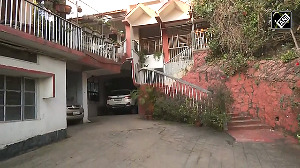With the stock markets in a downward spiral, it comes as no surprise that few want to invest in equity markets. This crash in the share prices, however, has proved to be a boon for banks, whose fixed deposits were ignored by the investors in favour of equities for higher returns.
These banks came out with various FDs, offering attractive rates. This has tempted many investors to opt for FDs. However, every investor in a fixed deposit must remember that FDs are also an investment option and as with any investment option, they too have their own pros and cons.
So be prepared to get the complete overview of this investment option before opting for it.
What is an FD?
An FD, or fixed deposit, is also a term deposit. It is similar to a savings account, except that your money is locked in for a certain period, also called 'term'. Hence the name term deposits.
However, while you cannot access your money, the bank rewards you by giving you a higher interest rate than it gives you on your savings account.
Is it the best investment option?
Remember, diversification is the name of the game when it comes to investment. Just putting your money in FD will not help you get the best overall returns.
You also need exposure to equities to get the growth in capital and beating inflation in the long run. Hence, it is advisable to invest into both equities and debt.
It will help you get higher returns from equities, while enjoying the capital safety offered by FD.
What are the advantages of an FD?
An FD has various benefits that make it an ideal investment option for those looking for capital safety.
Low risk: An FD is comparatively lot safer than equities, as your deposit up to Rs 1 lakh (Rs 100,000) is insured by Deposit Insurance Credit Guarantee Corporation. So, in case the bank fails, your money is still secured. This makes FD an ideal investment option for senior citizens.
Regular income: Unlike dividends given by the companies, the interest earned on an FD is fixed, as the rate of interest for the particular term is constant. Even if the rates increase or decrease subsequent to your opening an FD, your rate of interest will not be affected.
So you are guaranteed a regular income, making it an ideal investment option for those looking for regular income.
Availability of loan: Are you looking for a secured loan? Then you can avail of a loan by offering your FD as collateral. While your FD continues to earn interest, the rate of interest for the loan will be a few notches higher than that of the FD.
Hence this type of loan works out cheaper than any other type of loan, since the bank has the assurance of claiming your deposit if you fail to repay the loan.
Saves taxes: For those looking for an efficient tax saving investment option, FD is a good option. While ELSS (Equity-Linked Savings Scheme) has the shortest lock-in period of three years, your capital is not secured.
On the other hand, PPF (Public Provident Fund) offers capital security, it has a lock-in period of 15 years.
The tax-saving FD offers the best of both the world, as your money is locked for just five years, while your capital is safe.
Are there any drawbacks?
While an FD does have a lot of pros, it does have its share of cons. Here are some of them:
Erosion of worth of capital due to inflation: Inflation means a loss in the purchasing power of the money. When inflation goes up, the purchasing power of money goes down. As the interest rates on FDs are lower than the rate of inflation, the purchasing power of your deposited money does go down. As a result, you end up eroding the worth of your capital.
Tax liability: Except for the tax-saving FDs, the interest earned is taxed. So you end up incurring tax liability. You are particularly affected if you are a high income earner.
What should I do?
The best option for you is to invest as per your goals. If you have any short-term goals -- i.e. goals that have to be met within three years, like buying a car, or going on a holiday -- then the FD is your best bet.
On the other hand, for long-term goals like retirement planning or your child's education, go for equities.
BankBazaar.com is an online marketplace where you can instantly get loan rate quotes, compare and apply online for your personal loan, home loan and credit card needs from India's leading banks and NBFCs.
Copyright 2008 www.BankBazaar.com. All rights reserved.






 © 2024 Rediff.com -
© 2024 Rediff.com -